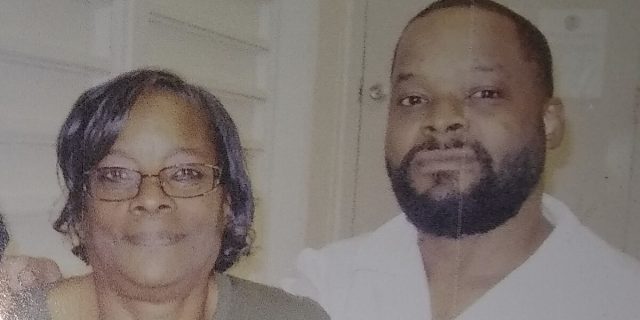By Beth Shelburne
www.wbrc.com
Former Alabama Supreme Court Chief Justice Drayton Nabers, Jr. and former Alabama Attorney General Bill Baxley have joined District Attorney Danny Carr’s call for a Jefferson County court to throw out the conviction of Toforest Johnson, an Alabama man facing the death penalty.
Baxley and Nabers were two of several dozen former prosecutors, retired judges, religious leaders, defense attorneys and legal scholars who filed briefs Tuesday asking Circuit Judge Teresa Pulliam to overturn Johnson’s murder conviction and grant him a new trial. Johnson has always maintained that he is innocent of the 1995 murder of William G. Hardy, a Jefferson County Sheriff’s Deputy.
Seven “friend of the court” briefs were filed in support of Johnson’s request for a new trial, an unusual outpouring of support from the Birmingham legal, faith, and activist communities. The briefs raised concerns about the credibility of a key witness and conflicting legal theories presented by the prosecution in different court proceedings. The briefs voiced strong support for Carr, whose office originally prosecuted Johnson and who has already called for the conviction to be set aside.
“When a prosecutor takes the extraordinary step of re-examining a previous conviction… if the prosecutor concludes that the conviction cannot stand, that conclusion should be given substantial deference,” Baxley and the former prosecutors, including former U.S. Attorney Joyce White Vance, wrote in a brief filed on their behalf by Adam P. Plant at Battle & Winn.
Many of the briefs were prepared by the state’s largest law firms such as Bradley Arant LLP, Balch & Bingham LLP, and Baker Donelson. The firms volunteered to draft and file the briefs in support of Johnson free of charge.
“I believe that when society confers on us the privilege of practicing law, it carries with it a responsibility to promote justice and to offer our services as officers of the court to ensure that all people have equal access to justice,” said Barry Ragsdale, a partner at Sirote & Permutt, P.C. “We were convinced, after reviewing Mr. Johnson’s case and reading that District Attorney Carr had joined the call for a new trial, that justice has not been served in this case and that we needed to help to right this wrong.”
While such briefs are common in the United States Supreme Court, none involved could remember an instance in which so many briefs were simultaneously filed by such wide-ranging groups in an Alabama circuit court.
“The collection of voices in these amicus briefs calling for a new trial is unlike anything I have ever seen in a case like this,” said Lindsey Boney, a partner at Bradley Arant LLP, who filed a brief on behalf of the Innocence Project. “The depth and breadth of the briefs – in terms of who filed them, the law firms representing those people and organizations, and the arguments they make – reflects the widespread concern, based on a wealth of powerful evidence, that Alabama is poised to execute an innocent man unless the court intervenes.”
Many of the leaders who filed briefs urged the judge to act in order to shore up public trust in the justice system.
“Across the nation, the public’s confidence and belief in our justice system – from law enforcement to the Supreme Court – has been eroded,” according to the brief Ragsdale filed on behalf of dozens of Birmingham faith leaders, led by the Greater Birmingham Ministries.
“The public is more likely to trust and respect a criminal justice system in which the participants are open to reforms, committed to transparency, and willing to admit and rectify mistakes when they occur,” the faith leaders wrote.
In calling for a new trial, Carr described his concerns about the fact that the prosecution presented five different theories about who killed Deputy Hardy. Carr did so after examining trial records and speaking to the lead prosecutor of the case, who agreed that a new trial was warranted. Prosecutors rarely make such calls for a new trial, but it’s not entirely unheard of. Alabama Appleseed Center for Law and Justice, a non-profit focused on criminal justice issues, filed a brief in support of Johnson describing three such instances and noting that the judges in those cases granted new trials.
“Alabama courts have fulfilled their responsibility to correct manifest injustice years after the petitioners’ fates seemed sealed,” attorneys at Lightfoot, Franklin & White wrote on behalf of Alabama Appleseed.
Defense attorneys, including the chief public defenders in Birmingham, Montgomery, Tuscaloosa, and Mobile, filed a brief in which they argued that when prosecutors and defense attorneys agree on a case, the court should pay close attention.
“When the District Attorney’s position is the same as the defense’s position… great weight must be given to the District Attorney’s position to further the interests of justice,” the defense attorneys wrote.
Alabama legal ethics scholars, represented by attorneys at Balch and Bingham LLP, filed a brief noting that the call for a new trial was supported by Alabama law and ethical rules. “Justice is, at the end of the day, about righting wrongs – including wrongful convictions,” the scholars wrote.
The briefs were filed in support of a post-conviction petition Johnson’s attorneys filed in December, which is pending before Judge Pulliam. Johnson’s attorneys declined to comment, noting that the case in front of Pulliam is on hold pending the outcome of another appeal in the case that is currently before the Alabama Court of Criminal Appeals.
Although Carr has asked Judge Pulliam to grant Johnson a new trial, the State is currently represented by Alabama Attorney General Steve Marshall. Marshall’s office has not yet taken a position on the new petition.
“For Mr. Johnson, while justice has certainly been delayed,” wrote the legal scholars, “it need not be denied.”
Beth Shelburne is an Investigative Reporter for the Campaign for Smart Justice with the ACLU of Alabama. She is a former WBRC Anchor, Reporter and Investigator. This post appeared originally on www.wbrc.com




